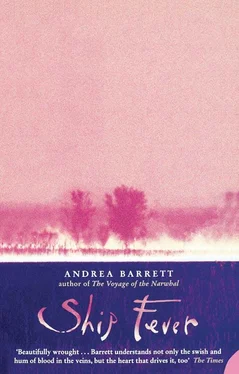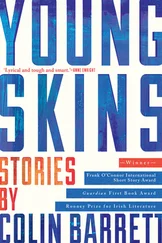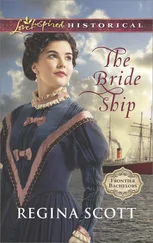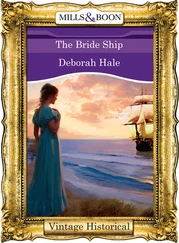As she paced the room, the sun cast the folds of her blue gown into deep shadow and struck silver highlights on her breast and shoulders and back. These glimmers were her only jewels, other than her wedding and engagement rings — although not born a Quaker, she’d been raised by her Quaker aunt and uncle after her parents’ deaths, and she still dressed simply. And yet, Lauchlin thought, part of her seemed to miss the glitter of her childhood. When he’d entered this sitting-room earlier, he’d found her kneeling before the tea-table, turning over the contents of her mother’s jewel box. The sight of that mahogany box, with its chased silver hinges and rose velvet lining, had frozen his greeting in his mouth. When they were very young, and had lived next door to each other, Susannah’s mother had sometimes let them play with the box on rainy days. The string of pearls Susannah held, and the hatpins — one tipped with cloisonné flowers, the second with an onyx knob — were as familiar to him as his own mother’s earrings and brooches.
“Do you want to put it on?” he’d asked, bending over to touch the necklace.
As he did so he’d remembered her, at age seven or eight, parading around her mother’s dim dressing room while the rain streamed down the windows. Her parents had gone out and the nursemaid who was supposed to be watching them had fallen asleep. Susannah had stuck the hatpins in her pinafore and, because neither she nor Lauchlin could open the clasp, draped the necklace over one shoulder and around the heads of the pins. She’d smiled broadly and tilted her chin, imitating her mother. Later she’d been given some modest jewelry of her own: a ring with a small ruby, which Lauchlin had watched her unwrap at her tenth birthday party; a dainty gold bracelet. And he had chosen, with his mother’s help, a pretty enameled hair-clasp for a Christmas present. Where had those things gone?
“I don’t like to wear them,” she said, dropping the strand back in the box. “But they’re so pretty to look at…remember these?” She held up a dangling pair of coral earrings.
“Of course I do,” he said. “Surely you could wear those? They’re very plain.” Her earlobes were just visible below the wings of her dark hair, which was parted in the center and drawn up in a simple knot. The coral drops would look lovely against her hair and skin, he thought.
She shook her head, but did not object when he crouched across from her and peered into the box. “Your mother dressed so beautifully,” he said. “And that whole house looked like her, somehow — those violet drapes, remember those? I used to think she must have picked them to match her eyes.”
“She might have,” Susannah said. Her own eyes were closer to gray than violet, and were set unusually far apart. They’d made her look oddly adult when she was a girl. Now they made her look girlish. “I wish I could picture her more clearly. Do you ever have times when you can see all the things around your mother, her clothes and jewelry and furniture — but you can’t see her face?”
“Sometimes,” he said.
Then he’d risen hastily, turned his back on her and the mahogany box, and produced the letter that seemed, suddenly, to have soured the afternoon. All because he couldn’t bear to think of the year when Susannah’s parents had died within a week of each other, and his own mother’s life had been extinguished like a lamp within a room he was not permitted to enter. Afterwards he and Susannah had been separated. She’d gone to her aunt and uncle’s house, in the suburb of St. Roch; he’d been shipped off to cousins in Montreal. Throughout those years, and then through his medical training and his postgraduate studies in Paris, he hadn’t seen her.
On his return to the city of Quebec two years ago, he had rediscovered her: grown and married to Arthur Adam Rowley. How had this happened? But the answer was obvious. She was intelligent and beautiful; Arthur Adam was tall and wealthy and clever. And although she had no more dowry than her mother’s jewel-box, her upbringing set her apart from many of the more frivolous young women in the city. Her seriousness fitted well with Arthur Adam’s ambitions. Already he’d made a name for himself as a journalist, despite the fact that he had no need to earn a living. He liked to make crusades in print, and to outrage his peers by taking up the causes dear to Susannah’s adoptive family. Older men predicted for him a career in politics.
Lauchlin had grown fond of him, despite twinges of envy. All that energy and enthusiasm, his warm hospitality and vibrant conversation — no, it was impossible that Lauchlin should resist him. And their growing friendship had meant he could see Susannah easily. He could knock on the initialed door, as he had today, and be sure of a welcome. Just now, though, he felt confused. Was it the information contained in the letter that had upset her? Or the fact that the letter had not been written to her?
“His news made me miserable,” Lauchlin said: both stating a fact and searching for the source of Susannah’s unhappiness. “It’s unbearable, what’s going on over there. And me here, doing nothing — I should be there.” He pressed his forehead against the glass, as if he could push through it to the air.
“It’s not as though Arthur Adam is actually doing anything,” Susannah said. “He’s watching. He’s writing. That’s what he does. Why does he write in such detail to you, and not to me?”
“He’s writing articles that move people,” he said, evading her question. “Move them to send clothes, money, food — that’s hardly nothing.”
“Anyone could do as much…oh, I don’t mean that, I know what he’s doing, how important it is — but I miss him. All the time.” She continued to pace, swishing her skirts against the heavy furniture. “Does he think I wouldn’t be interested? Why can’t I be there?”
“It’s no place for a woman.”
She spoke as if she hadn’t heard him. “Stuck here, sorting old clothes and running bazaars…and feeling you watching me all the time. He asked you, didn’t he? To keep an eye on me.”
“Only the way a friend would ask another friend — to ease his mind, you know. And perhaps to make sure we each have some company in his absence.”
“That’s how you see yourself? As company?”
Was she mocking him? The room was stifling. He had taken great pains, he thought, not to let her know the depth of his feelings for her. He had been friendly but no more than that; well-mannered, discreet. Although it was true he fussed over his clothes when coming to see her. Now he sneaked a glance at the oval mirror hanging from a cord on the wall. Bushy red hair as neat as a pair of brushes could make it in this weather; a flush spreading from his cheekbones across his freckled, blocky nose. His new shirt was handsome enough, but for all it had cost it still bunched at the collar as if made for a smaller, daintier man. He sat and extracted a fat, prickly cushion from under his elbow. Then he flushed more darkly as he caught Susannah’s gaze.
“Vain boy,” she said. She settled herself in a low chair and poured the tea.
“I am not. ” But even as he protested he found himself oddly comforted by her tone, which brought back the bickering of their childhood. Once, in the garden behind his family’s house, they had argued for hours over a passage in a book.
She shrugged, spilling tea into her saucer. “I was only teasing.” Then she let out a small, exasperated sigh. “But here I am. And here you are. Both of us wanting to be over there. I wish you’d stuck with your work at the hospital.”
“But the director wouldn’t let me do anything…bleed, bleed, bleed; that’s all he does, and all he wanted me to do.” He reached for more sugar. “You know that.”
Читать дальше
Конец ознакомительного отрывка
Купить книгу












